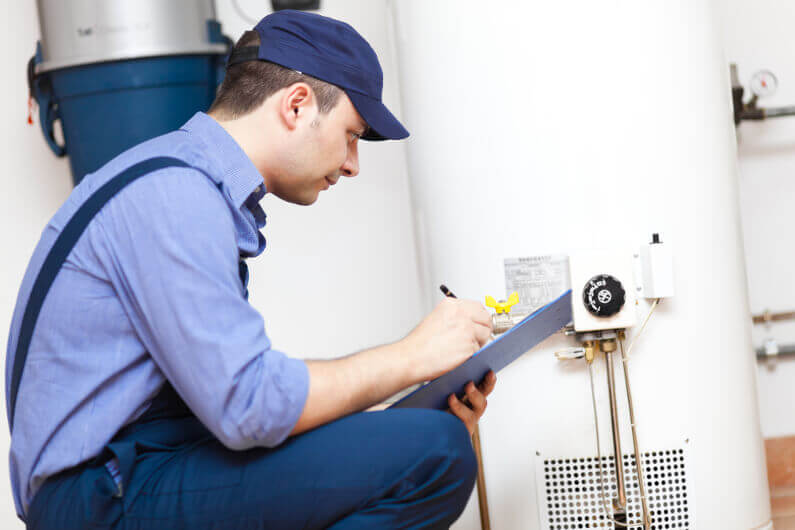There are few things worse than being in a suddenly-cold shower. Unfortunately, water heater tanks are appliances we often take for granted until they stop working.
These heaters can run efficiently for years if they’re installed well and maintained properly, but they do require a little bit of upkeep at times. This includes things like checking the pressure valve or inspecting the area for leaks.
But one thing homeowners may be a little less clear on is the draining water heater issue. Is it really necessary to drain a water heater? And if so, when do you do it?
If you’re ready to take this preventative maintenance into your own hands, here are a few tips.
Reasons for Draining a Water Heater
As sediment accumulates at the bottom of your tank, no matter the quantity, it can gradually make your tank work harder to heat the water. This in turn means you’re throwing more money at your utility bills each month.
An additional risk is that the buildup of sediment can damage your water heater over time. This sediment, usually composed of various minerals or scattered debris, can eventually cause your tank to malfunction.
The idea behind draining a water heater regularly is that removing this sediment can lengthen its lifespan, earning you hot showers for longer. After all, a clean and unclogged water heater doesn’t have to work as hard to keep your water warm!
Signs You May Need to Drain Your Water Heater
It can be hard to diagnose what’s going inside the metal walls of your water heater. Without a way to see inside, it’s hard to say with 100% certainty that your tank needs draining until you’re doing it. As you try to decide the best course of action, here are a few things to keep an eye out for:
- No or little hot water. If your water heater tank isn’t actually heating your water, it’s likely a sign of either a faulty burner or a buildup of sediment inside. In this case, you should drain your tank. Depending on the type of buildup, you might also need to add cleaning chemicals such as vinegar or a lime descaler—but if you aren’t sure what minerals are at play, call an expert for help.
- Strange smells. These odors may mean there are bacteria at work in the sediment buildup. If so, you may need a plumber to sanitize the tank and drain it for you.
- Unusual noises. Loose sediment within the tank can scrape against the metal as the water enters and leaves the tank.
So Do You Need to Drain Your Heater?
The answer is, it depends.
Every hot water tank is different. Your needs will depend on a spectrum of factors, including:
- Whether you’ve noticed any of the signs above.
- Where you live in West Columbia or the surrounding region. The water flowing to each area will see a different number of water filters on its way to the homes there.
- The mineral content and softness of the water running to your home. Harder water is in turn harder on your water heater tank. Fortunately, West Columbia has moderately soft water.
- The age of your water heater tank.
- Your manufacturer’s recommendations.
As for when to perform this type of maintenance, it also depends on the factors above, as well as your manufacturer’s recommendations. Some companies advise that you drain off a gallon of water once a month. Others recommend a full drain once a year. However, as a general rule of thumb, once to twice a year is ideal.
How to Drain Your Water Heater
Ready to take the plunge? Below, we’ve gathered some general tips on how to drain your tank.
- Shut off the water supply. You can do this via the shutoff valve at the top of the water heater.
- Turn off the power. To protect the heating elements, make sure to check your fuse box to disconnect the heater from your home’s power. For gas water heaters, you’ll need to shut off the gas supply.
- Let the water cool. Wait at least a few hours to minimize the risk of injury from the hot water.
- Attach a hose to the water heater drain valve. You can use your garden hose for this. Attach it to the valve at the bottom of the water heater drain pipe below the tank. Put the other end of the hose somewhere you’re comfortable allowing the runoff to go. We recommend not using a water heater drain pan for this, as you’ll be draining a great deal of water.
- Turn on a hot water tap near the water heater, to help the water from your draining water heater flow more quickly.
- Open the drain valve to let the water flow out of the tank until it’s empty.
- Turn the water to the tank back on. This will flush out any remaining sediment. When the water from the other end of the hose runs you know the draining is done.
- Shut off the hot water tap.
- Turn the water heater on again.
Also, note that this is a good opportunity to check the valve as well. If your drain valve is worn and leaky from prior draining, it may be time for a water heater drain valve replacement or upgrade, especially if your heater still has the cheap plastic valve it came with.
Long-Term Preventative Maintenance
Draining a water heater may not seem all that important in the grand scheme of things, but this critical chore can lengthen the lifespan of your investment with just a few hours’ work. For best results, add it to your yearly maintenance checklist to keep it top of mind.
As always, if you’re unsure of your ability to do this kind of maintenance on your own, call a professional. We’re happy to help!











enjoyed reading the information about draining the indirect water heater.
When you are flushing the inside of tank, can the water pressure damage the inside of the tank?
When going on vacation, it is wise to turn off the central water shutoff valve and empty the hot water heater. Draining the water heater is essential if you have to leave your house for a few weeks in the winter so that it doesn’t freeze and cause the pipes to burst.
Yes, if for some reason you want to totally turn off your water heater when you leave town. Why not put it on a low tempature. Many of them have a “vacation setting” Believe me, it won’t freeze.
Here is one caveat. I have a 12 year old water heater. I recently learned that water heaters should be drained annually for all the reasons in this article. So, I drained my gas water heater and felt good about that until the next day when the heater started leaking from the bottom seams. I did some internet searches and learned that if you have never drained your water heater it’s not a good idea to do so later in its life. The WH builds setiment/corrosion deposits which in some cases is the only thing keeping the bottom intact. When you completely empty an 8′ high tank, then drop pressured water against a corroded bottom you can see how the tank would start to leak. In the end, I recommend either flush the WH annually OR don’t do it at all.
Jim
Thank you so much for this comment!! I was just trying to figure this out. I didnt know draining a WH was a thing and now mine is 8 years old. I was concerned that draining it now would cause more problems. I dont have any of the symptoms described in this article AND after the first year or 2 i put in a water softener. I was torn whether to drain or not. I think Ill stick with not drain and then figure it out if this one ever needs to be replaced.
Replaced the pop off valve in 2021 (leaking) that was the first time I opened the tank drain.(only to get water lower than valve) The water heater was installed 03/14/03 it was a AO Smith. 12/30/23 small leak from tank, a drip per second, 01/04/24 replaced tank. (Rheem) That tank lasted very close to 20 years, I will do the same with this one, just leave it alone and DO NOT DRAIN IT EVERY YEAR.
After draining the hot water heater, how best to bleed the pipes from clearing the air out of the system?
I am leaving for missionary work for two years. I will have family checking on the house frequently. I am planning to turn off the water main. Do I turn off and drain the water heater completely? I have seen completely opposite answers on the internet, i.e., drain it to prevent bacteria, don’t drain it or heating elements in empty tank will corrode and ruin heater.